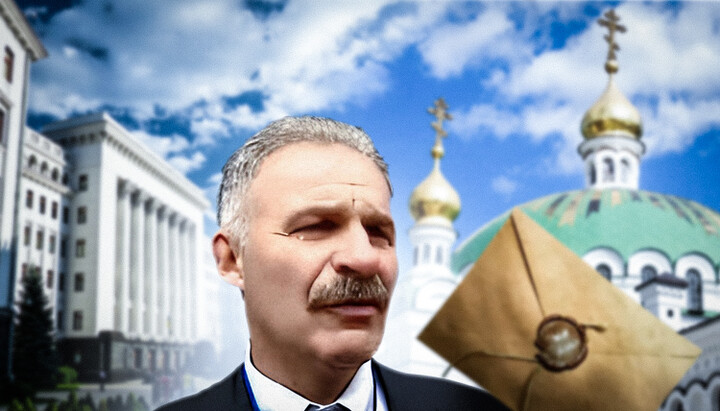"UOC’s letter" to authorities: all the "i" are dotted, awaiting a reaction

Journalists wrote a letter to DESS where they proved that the authorities' claims against the UOC are unfounded. And if nothing changes after it, we will draw conclusions about the sincerity of these claims.
The UOJ have already analysed the publication by the editorial team of Dialog.tut entitled “Letter from the UOC to the Local Orthodox Churches – what it could be like”, where its strengths and weaknesses were brought into focus. But now, a similar "letter from the UOC" from the same journalists addressed to the head of the State Ethnopolitics Service (DESS), Viktor Yelensky has appeared.
This letter carefully and reasonably analyses the entire spectrum of UOC's relations with the state and society. This document goes far beyond a "regular" publication from one of the church resources. It's a manifesto, whose positions cannot be refuted.
Undoubtedly, the DESS head, Viktor Yelensky, and all officials shaping the state's policy towards the Church will read it. And if after reading the "Letter" nothing changes in this policy, we will be able to draw quite definite conclusions about the authorities. We'll discuss them after a brief overview of the "Dialog.tut" document.
The UOC, at the level of documents, declared its patriotism
The Church's stance on various issues is determined by the official statements of the Primate and the Synod. The UOC declared its support for Ukraine in the first days and even hours of the war when not everyone was hopeful that the country could repel the enemy's invasion. These are the statements by Metropolitan Onuphry of February 24, 2022, and the UOC Synod of February 28, 2022. In these documents, firstly, full support for Ukrainian soldiers was expressed, secondly, support for Ukraine's sovereignty was voiced, and thirdly, there was an appeal to the Patriarch of the Russian Orthodox Church to speak to the authorities of the Russian Federation to stop the bloody war.
All of this is undeniable evidence. Some may not like them, but they cannot be ignored.
Why can't you just declare autocephaly on your own?
Dialog.tut rightly points out that in State Ethnopolitics Service actually demands that the UOC "declare its own independence (autocephaly)". However, such a self-proclamation is likely to result in the UOC finding itself in an uncertain canonical status.
"The question of schism, that is, the possibility of our Church becoming a structure not recognized by the global Orthodoxy, whose sacraments can be doubted, is the most acute for our self-awareness and the awareness of many of our faithful. This was the situation of the 'Kyiv Patriarchate' for two decades, and we consciously seek to avoid such a fate for our Church. For us, this question has more priority than the formal acquisition of autocephalous status through self-proclamation," as rightfully stated on Dialog.tut.
And the key issue here is the Letter by Patriarch Alexy, which says that the UOC is united with the Ecumenical Church through the ROC. It is precisely this point of the Letter that forms the main claims of DESS.
This is indeed an ambiguous wording. But now, what's important to the believers is that any misunderstandings are resolved within the Church rather than through external pressure.
"In our understanding, such a formulation confirms our connection with world Orthodoxy in the way that was possible at the time of the issuance of this Letter. Our connection with universal Orthodoxy is most important to us, and how to change the situation so that it's not done through the ROC, whose leadership supported the war against Ukraine, should be a subject of dialogue at the pan-Orthodox level," as stated in the Dialog.tut document.
We can only add that matters of spiritual ties between Churches should not concern the state of a "healthy person" at all. Authorities might only be interested in administrative relations. Roughly speaking, whether Moscow’s orders are being followed in Kyiv or not, whether the dissemination of the ideas of the "Russian world" is possible through the UOC or not. And the Council of the Ukrainian Orthodox Church of May 27, 2022, through its decisions, ruled out such a possibility even theoretically.
The UOC condemns the "military rhetoric" of the ROC
At the UOC Council on May 27, 2022, a decision was made expressing "disagreement with the position of Patriarch Kirill of Moscow and All Rus regarding the war in Ukraine."
Since then, a series of statements have followed, indicating that the UOC holds a directly opposite position on the war in Ukraine compared to the stance expressed in the ROC.
Dialog.tut reminded Yelensky of the letter from Metropolitan Eulogiy of Sumy to Patriarch Kirill and the strongly worded response from Archbishop Viktor of Artsyz.
The UOC also does not accept the de facto annexation of its eparchies in southeastern Ukraine. Metropolitan Onuphry said this in his address on Statehood Day: "Some of our eparchies and believers have ended up in the occupied territory. We often have no communication with them, and we can't practically help them in any way except by praying for them. However, these are our eparchies, these are our people, we pray for them, we consider them our brothers and sisters, and we expect them to reunite with us in a united independent Ukraine."
Individual, not collective responsibility
Yes, there are clerics in the UOC who were involved in the collaboration. However, in the overall number of clergy and monks in the UOC, they are a drop in the ocean, a fraction of a per cent. Collaborators can be found in any organisation – among civil servants, police, security services, and even MPs. And the percentage of traitors is often much higher there than in the UOC. Nevertheless, we don't hear expressions like "a Moscow cop" or "a Moscow SBU agent," we only hear "a Moscow priest." And this is the result of a frenzied media campaign, which is, unfortunately, largely supported by the authorities.
Transfers of temples to the OCU do not mean people's transfers there
Dialog.tut rightfully highlighted that forcibly transferred temples to the OCU stand empty, and people go to pray in homes or adapted premises; the promoted "Ukrainian Lavra of the OCU" turned out to be an empty shell – out of 250 monks, only one moved to Dumenko's side. In other words, the government's pressure on the Church has yielded no results. As Dialog.tut writes, these methods have "exhausted themselves in the public consciousness".
The struggle against the UOC is a struggle against the unity of the country
Dialog.tut notes that the hierarchs of the UOC have repeatedly called for unity among Ukrainians and stressed that repressions against a portion of society disrupt such unity.
We will add here the statement of the former Advisor to the President's Office, Alexey Arestovich, who mentioned that at least 6 million Ukrainians consider themselves part of the UOC. And according to the latest population data, this accounts for nearly a quarter of the country's population.
"We want a normal state, or do we want to be idiots for the sake of the primitive technology of division? This is political technology, not cultural policy. It's very simple: either we behave like rational people or like idiots. For now, we're behaving like idiots," Arestovich said. And can we really disagree with him?
Dialog.tut rightfully tells Yelensky: "The policy of transferring parishes from the UOC to the OCU, according to data from the State Service subordinate to you, rather than uniting the country in the fight against external enemies, divides Ukraine into two parts." And this is an obvious truth.
The authorities can actually help the UOC
Dialog.tut suggests that instead of repressions against the UOC, the authorities should take steps that could really benefit millions of Ukrainians – assist in organizing dialogue at the pan-Orthodox level. Can the government do this? Certainly. But the question is – do they have the desire to do so?
***
The letter from Dialog.tut is highly factual. Perhaps, it could have been supplemented with something else, for example, the fact that a significant number of believers from the UOC are fighting on the frontlines, including the sons and relatives of priests. But overall, this document fully reveals the essence of the state-UOC relationship, laying it all out clearly. It presents arguments that an objective person (emphasizing – objective) cannot ignore or refute.
And if, after its publication, nothing changes in relation to the UOC for Yelensky, the State Ethnopolitics Service he leads and other bodies, it will only mean one thing – all their demands and claims towards the Church are just demands and claims. If the UOC fulfils them, new ones will appear, followed by more, and so on.
This somewhat resembles the "wishes" that Ukraine receives from its Western partners regarding NATO and EU membership. One set of conditions replaces another, then a third, and so on. And everyone understands that they simply do not want to see us there, and these new demands are just excuses they use to justify their unwillingness to accept us.
Today, it's crucial to understand how sincere the authorities are in their requirements towards the UOC. This will allow us to avoid unnecessary moves in the search for a way out of the current crisis. After all, we can persistently sign petitions, write open letters, declare our immense assistance to the front, prove our support for the country in every possible way, etc. But what if it turns out that all of this is just wasted time? If the authorities want something entirely different from us – a willingness to fulfil ALL of their demands: not only in the administrative sense but also in the canonical (which is already happening) and dogmatic (which might happen tomorrow) sense?
What then? Should we obediently "go all the way" just to avoid disappointing those in power, or should we firmly say "no"? Because all the facts presented by Dialog.tut indicate that the UOC is being targeted for entirely fabricated reasons, and therefore there will be no end to our "concessions" until we find ourselves outside of the Church. Or is this a plan to destroy not only the UOC but also the entirety of Ukraine, as purposefully pitting one group of Ukrainians against another is nothing less than the destruction of the state?
And the people who do this hardly expect to live here, they hardly expect their children to live here either. Perhaps, such words look conspiratorial, but it is extremely difficult to explain everything that is happening in another way.












